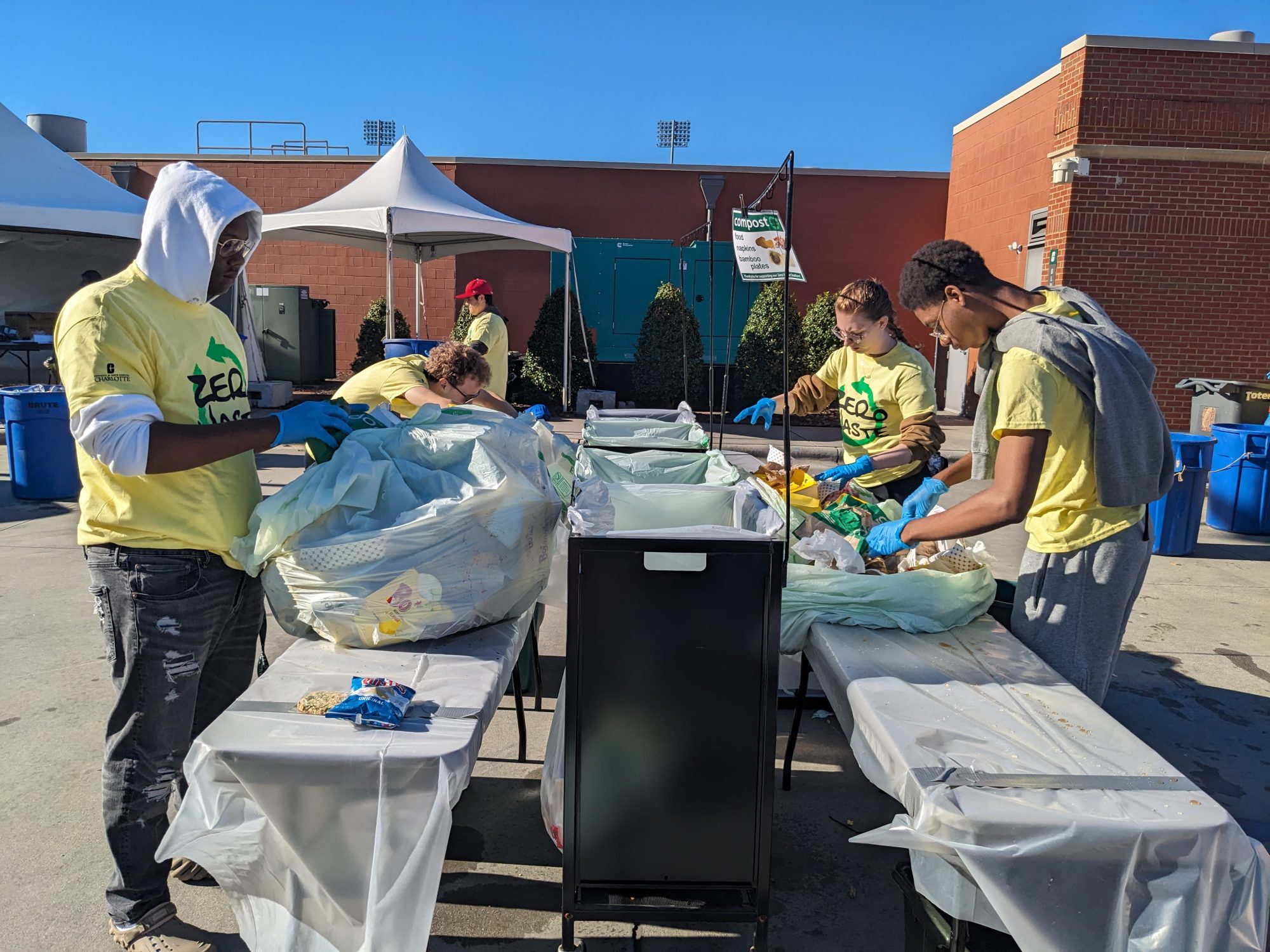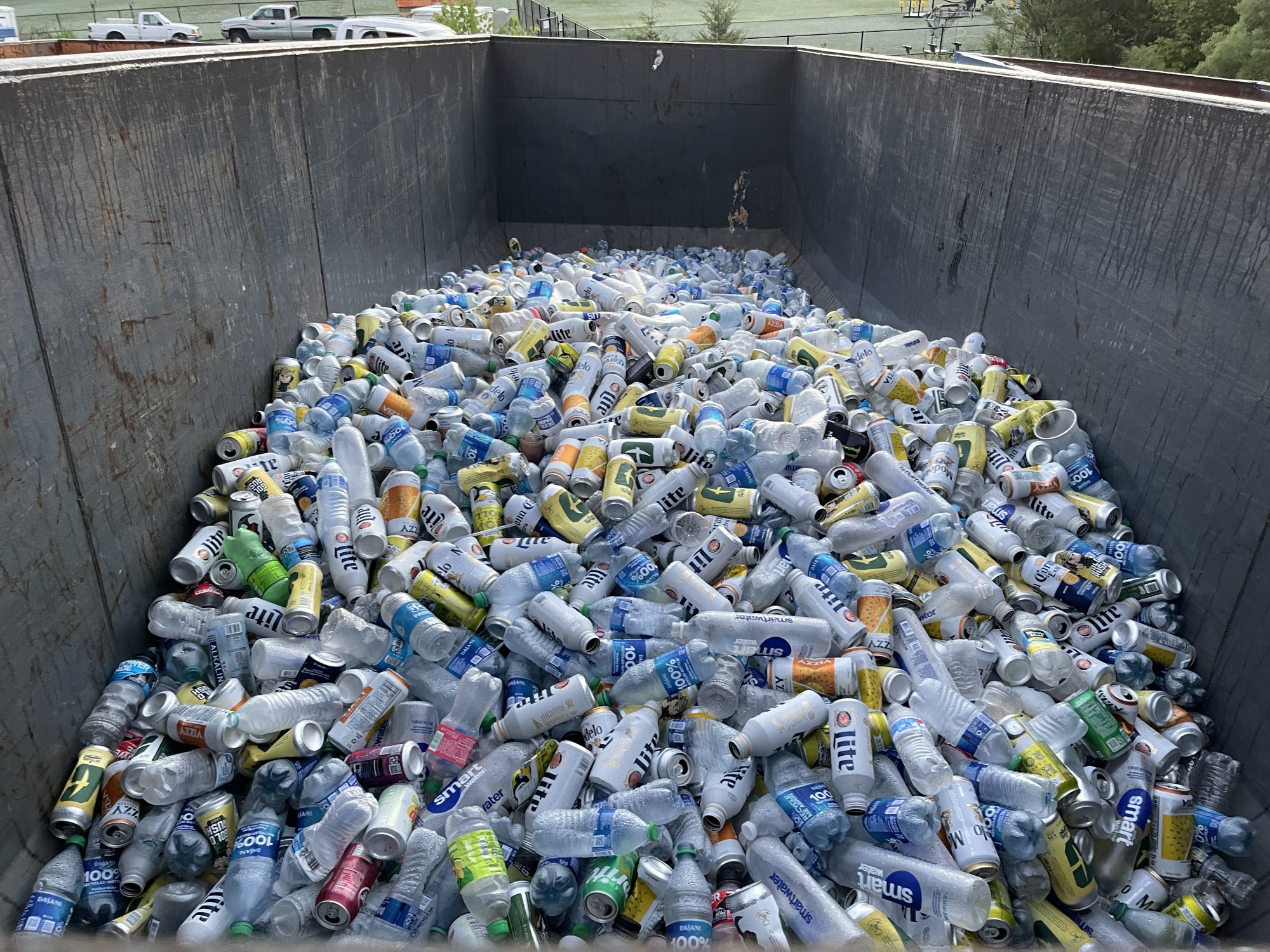Getting our hands dirty for good: How UNC Charlotte keeps its zero waste stadium promise

On the same day that UNC Charlotte broke ground on a new football stadium in April 2011, the Student Government Association passed a resolution about its operation. The resolution requested the University manage the stadium as a zero waste facility and defined that goal as diverting over 90% of waste away from landfills. It also directed UNC Charlotte to choose food-service vendors committed to zero waste practices and all packaging be either compostable and/or recyclable.
Zero waste is an ambitious goal that challenges businesses and organizations to find ways to reuse, compost or recycle waste generated. Since 2009, UNC Charlotte has been obligated to meet the UNC System Sustainability Policy, to develop “programs that work toward achieving zero waste.”
From the start, the Zero Waste Stadium initiative required coordination by three different campus teams including facilities management, auxiliary services (and contractor, Chartwells) and the Athletics Department. They chose collection bins, lined up waste contractors, trained staff and purchased materials that could be recycled or composted. Facilities Management, through its Building Environmental Services and Recycling unit, also staffed the inspection and sorting of stadium waste after each game.
Having to sort through tons of stadium waste may sound extreme. But post-event sorting is routine for large event venues and is recommended in the waste management playbooks of the Green Sports Alliance. The extra effort ensures that composting or recycling companies receive clean shipments of these valuable materials from UNC Charlotte. A shipment with too much trash could be rejected and end up lost to a landfill, echoed by a loss of jobs and materials for the North Carolina economy.
2022: A fresh start
For the 2022 football season, the Office of Sustainability updated the Zero Waste Stadium initiative. Led by Shannon Caveny-Cox ’98, solid waste coordinator, the team reviewed equipment and staffing and made some big changes.
The first step was a grant proposal to the Charlotte Green Initiative, the student green fund, to replace aging stadium bins.The organization provided $25,000 to purchase new bins, which have multiple features to improve waste sorting by fans inside the stadium.

The second step was to change the waste collection staff for football games. Student workers were hired to replace contractors who initially collected the waste from the bins; they helped fans puzzled by the lack of trash containers on the concourse.
The third step was the boldest. The post-game sorting event became a community service project for students. Instead of creating an overtime worker assignment, the sorting event provided students with a positive and educational experience.

The people behind zero waste
During football season, the Zero Waste Stadium initiative covers six home games plus the day-after sorting events. The initiative also covers the spring scrimmage game and other large events, including this month’s Famous Toastery Bowl game.
For the 2023 football season, University staff and sustainability aides (12 student workers from the Office of Sustainability) worked 625 hours. Another 286 hours of volunteer time came from student organizations. The University Honors Program provided volunteers for every sorting event and multiple Greek organizations participated in individual events
This is the second season in which the UHP has been the leading volunteer organization for the Zero Waste Stadium events. “Over the years, the students have realized the tremendous impact these events have on the environment and are eager to sign up and contribute to the cause,” said Denise Lynch, assistant director of student experience in the Honors College.
The experience for student workers and volunteers can be memorable. It is a behind-the-scenes look at how much (or little) care people take to handle the waste they generate. Every bag is opened to inspect and sort into “waste streams” including several categories of recycling (cardboard, paper, bottles, cans and several plastics), compost and trash. Sorted materials are carted to dumpsters for delivery to local companies. There are hot, cold and rainy days. The students meet and work side-by-side with University employees who handle our waste every day.
“I think we are building appreciation for both the professional staff who clean the campus and for the valuable materials we can cycle into our local economy,” said Mike Lizotte, university sustainability officer.
 Carrying and sorting a stadium load of waste lets students see what it takes to handle waste responsibly.
Carrying and sorting a stadium load of waste lets students see what it takes to handle waste responsibly.
“Being involved in zero waste football has been the best hands on experience I’ve had on campus that truly makes a difference on waste management,” said Lydia Knier, a second-year sustainaibilty aide with the Office of Sustanability. “It’s fascinating to see how much waste we produce and how much of it truly ends up being recycled and composted.”
The results
In past years, it could take weeks before shipment weights were reported back to campus, making it difficult to communicate our success. This year, thanks to growth in volunteering for the sorting events, volunteers weighed materials at each event. Now volunteers learn the results before the end of the event, making their impact more tangible and personally rewarding. This season, fans, workers, volunteers and contractors helped the University divert an average of 83% of game day waste from landfills.
Next steps
There is still room for improvement. Professional sports venues, such as the Spectrum Center in Charlotte, are able to divert more than 95% of waste from an event. Future improvements at the University’s stadium could include looking into additional compostable or recyclable packaging.
The Zero Waste Stadium efforts can give us the confidence to achieve bigger goals. Campuswide, the diversion rate is about 30%, changing little over the past two decades. That rate is similar to the average for U.S. communities, but campuses usually do better. UNC Charlotte has a goal to reach 60% diversion by 2030.
The University is improving operations to increase diversion. Styrofoam recycling has increased since the campus added new equipment to densify the material for shipment to recyclers. Next semester, a pilot program in the Fretwell Building, funded by the students through Charlotte Green Initiative, will test campus ability to collect paper towels from restrooms for shipment to a composter.
But in the end, the change depends on people. Caveny-Cox said “this program only works because we have great partnerships with our staff, students and contractors. They make it possible for us to keep improving and learning each year to build on successes like the Zero Waste Stadium initiative.”
Editor’s note: The zero waste crew is always looking for volunteers to support its efforts! ITo learn more about volunteering during the 2024 football season, email at sustainability@charlotte.edu and visit its website for additional information.